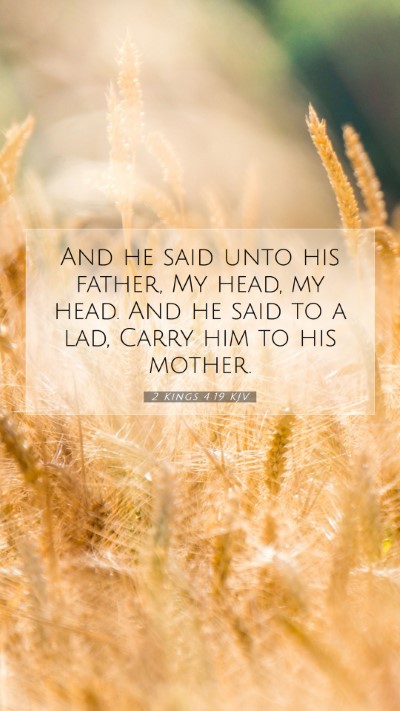Understanding 2 Kings 4:19
In 2 Kings 4:19, we find a specific moment that reflects deep emotional turmoil and spiritual significance in the narrative of the prophet Elisha. The verse states:
"And he said unto his father, My head, my head. And he said to a lad, Carry him to his mother."
Overview of the Verse
This verse captures a poignant moment when a young boy, who is suffering from a severe headache, expresses his distress to his father. In this painful scenario, the father sends the boy back to his mother, signifying both a return to maternal care and a desperate attempt to remedy the situation
Commentary Insights
-
Matthew Henry:
Henry emphasizes the simplicity and profundity of parental love displayed in this scene. The distress of the boy, indicated by his cry, is symbolic of the human condition—our moments of vulnerability amid life's challenges.
-
Albert Barnes:
Barnes elaborates on the imagery of the boy's complaint, illustrating the idea that physical suffering often leads to emotional turmoil. The father's response demonstrates a common instinct to seek nurturing during physical distress, highlighting how the family unit plays an integral role in comforting one another.
-
Adam Clarke:
Clarke underscores the importance of the mother in this context. The act of sending the boy to his mother signifies the natural inclination to seek comfort from those who provide solace and support. Additionally, this gesture encapsulates themes of protection and familial bonds during distressing moments.
Key Themes
The themes reflected in this verse can be categorized into several vital areas:
- Parental Care: The verse highlights the instinctive response of a parent to care for their child in distress.
- Spiritual Symbolism: It conveys the necessity of returning to a place of safety and reassurance, paralleling the relationship between believers and God.
- Community and Support: The interaction exemplifies the significance of family in providing emotional and physical support during moments of crisis.
Practical Applications
When reflecting on 2 Kings 4:19, believers can derive various applications for their daily lives:
- Recognize the importance of seeking support from loved ones during times of adversity.
- Understand that vulnerability is a part of the human experience and that it is acceptable to lean on others for help.
- Foster nurturing relationships within the family unit, recognizing the strength that comes from shared support.
Related Cross-References
- 2 Kings 4:26 – Elisha's care for the Shunammite woman.
- Matthew 23:37 – Expressing yearning for the care over a lost and wandering people.
- Psalm 27:10 – Highlighting the strength of familial bonds in times of trouble.
Conclusion
The emotional and familial dynamics encapsulated in 2 Kings 4:19 provide rich material for Bible study insights. This verse opens avenues for deeper understanding and compassion, encouraging believers to explore the layers of human experience and divine connection present in Scripture.


